John Deere 1600 Turbo Series III Wide-Area Mower

| Make | John Deere |
| Model | 1600 Turbo Series III |
| Type | Front & Wide Area Mowers |
Your Preferred Location
Description
Turbocharged diesel engine
B20 compatible
Rear-discharge decks
FT4 engine compliant
Models
Exclusive air-intake system draws clean air from the top of the machine for consistent cooling
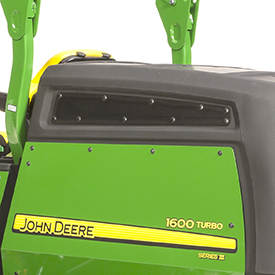 Air-intake system
Air-intake system
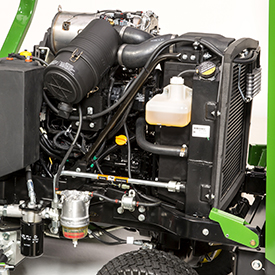 High-capacity cooling system
High-capacity cooling system
An innovative, exclusive air-intake system draws clean air from the top of the machine instead of the rear. This keeps the radiator cleaner and prevents the engine from overheating.
The high-capacity cooling system combines the radiator and hydraulic oil cooler.
Excellent performance from high-traction tires and low-maintenance caster tires
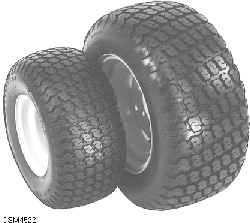 Tires
Tires
Large, 18x9.5-8 steering (rear) and 26x12-12 (front) drive tires provide excellent traction and flotation. Both tires have a six-ply rating.
Caster tires
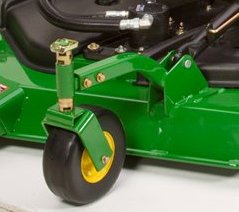 Caster tire
Caster tire
Semi-pneumatic mower deck caster tires are standard equipment. Benefits provided by semi-pneumatic tires include:
- Looks and performs like a rubber air-filled tire
- No flats means reduced downtime
- Reduces maintenance time and expense
- No need to worry about inflating caster tires ever again
- Reduced incidents of caster tires rolling off of the rim
- Semi-pneumatic tires never need air maintenance, nor will they become flat when punctured, making them truly flat-free
Serviceability is designed-in to reduce maintenance cost and increase uptime
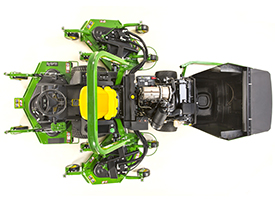 Hood and seat platform open for excellent access
Hood and seat platform open for excellent access
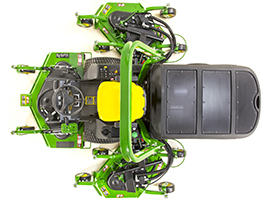 Overhead view
Overhead view
The hood and seat platform open for excellent access to the engine and drivetrain. All daily service points are located on the left side of the machine:
- Fuel fill
- Engine oil check
- Engine oil filter
- Hydraulic oil fill
- Hydraulic oil filter
- Air filter restriction indicator
- Engine coolant check
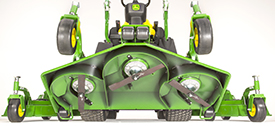 Front deck raised 70 degrees
Front deck raised 70 degrees
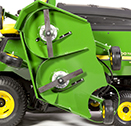 Wing deck raised 90 degrees
Wing deck raised 90 degrees
The wing decks raise 90 degrees, and the front deck raises 70 degrees for excellent access.
No tools are required to access the mower deck belts.
Diagnostic control module
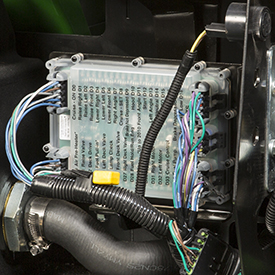 Control module
Control module
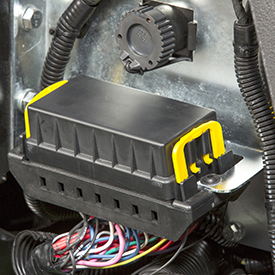 Fuse box
Fuse box
The diagnostic control module features light-emitting diode (LED) lights and a heartbeat to aid in diagnostics and lead the technician to the proper circuit. Each switch on the machine has its own LED light on the controller, so input and output functions can be diagnosed by observing the appropriate lights.
Service ADVISOR™ diagnostics system
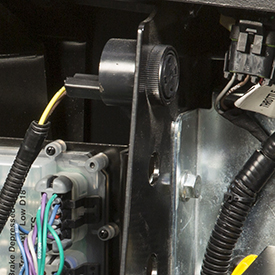 Diagnostic port
Diagnostic port
Service ADVISOR is a John Deere dealership tool capable of providing technical and machine support for technicians and service managers using a laptop computer. It provides symptom-based diagnostics information, machine information, electronic technical information, and connection to John Deere through an extranet at workshops and in the field.
A data port outlet socket is provided on the right-hand instrument panel next to the diagnostic control module console to access important service information with a laptop computer equipped with Service ADVISOR software. Service ADVISOR reduces downtime by allowing technicians to quickly identify the root cause of problems, aid them in identifying the component needing repair, and aid them in the repair procedures. It also significantly reduces the amount of printed materials the technician is required to have at their disposal to perform the repair or maintenance work.
Quick-access foot panel for easy access
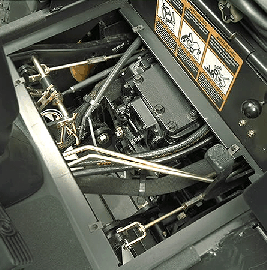 Quick-access foot panel
Quick-access foot panel
The foot panel is easily removed to allow quick and easy access to service points.
Two-post folding Roll-Gard™ rollover protective structure (ROPS)
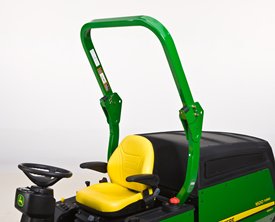 Two-post Roll-Gard ROPS
Two-post Roll-Gard ROPS
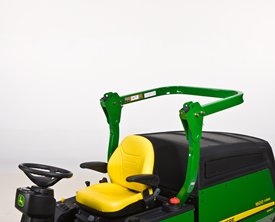 ROPS folded down for clearance
ROPS folded down for clearance
The two-post folding Roll-Gard ROPS and seat belt are standard equipment:
- When used in combination with seat belts and safe operating practices, the ROPS is effective in reducing serious injuries and death from rollover accidents.
The standard-equipment Roll-Gard ROPS can be folded to allow for additional clearance when needed. With the ROPS in the folded-down position, the machine fits under a standard doorway.
The ROPS meets the International Organization for Standardization (ISO) 21299 ROPS standard – defined test procedures and acceptance criteria for the rollover protective structures of powered ride-on turf care machinery. Under the support of the Outdoor Power Equipment Institute (OPEI), a panel was formed that brought together an international group of ROPS experts that presented the best-learned practices regarding off-highway vehicle operator crush protection. The result of this undertaking is a standard dedicated to protecting operators of powered ride-on turf maintenance equipment.
The ROPS can be folded down without tools for operation under tree canopies or in other confined operating spaces. Operators should leave the ROPS in the upright position for all other mowing:
- The folding ROPS enhances operator safety and still provides clearance when loading on enclosed trailers.
Folding the ROPS is simple - remove two pins and rotate the top of the Roll-Gard ROPS down. Adjustments can be made from the operator's station.
The folding ROPS performance is certified at the date of manufacture, per the following standard:
- ISO 21299
Powerful turbocharged diesel engine for superior performance
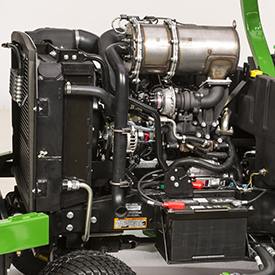 1600 Turbo Series III Wide-Area Mower (WAM) engine
1600 Turbo Series III Wide-Area Mower (WAM) engine
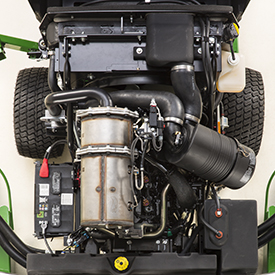 1600 Turbo Series III WAM engine
1600 Turbo Series III WAM engine
The 1600 Turbo Series III WAM is powered by a liquid-cooled, turbocharged, four-cylinder, 60-hp (44.7-kW) at 3000 rpm, PS diesel engine.
Engine features include:
- 117.3 lb-ft (159 Nm) of torque at 3000 rpm for extra lugging power on hills and in tough mowing conditions
- Large 127.6-cu in. (2.091-L) displacement, which produces the torque needed to handle hills and tough mowing conditions
Engine is a 16-valve (four valves per cylinder, two intake and two exhaust) design:
- Cold-start device to increase engine timing for improved cold starting
- Full-pressure lubrication for positive lubrication with continuous operation on slopes
- Dual-element air filter that is completely sealed for effective cleaning
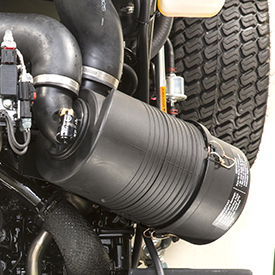 Air filter with air-restriction indicator
Air filter with air-restriction indicator
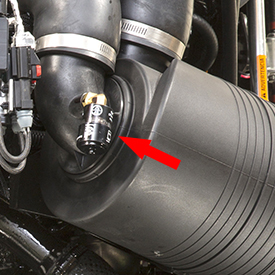 Air-restriction indicator
Air-restriction indicator
- Progressive-type air-restriction indicator to let operator know when the filter needs servicing
- Automotive-type alternator (75 amp) that provides plenty of charge to the battery
- Glow plugs for quick starting in cold weather
- Automotive sensing system, which tells the operator when the engine is ready to start
- Isolated engine mounting, which reduces engine vibration in the operator's station for more comfortable operation
Direct fuel injection
- Injects fuel directly on top of pistons for more efficient combustion, less emissions
- Delivers more power per gallon of fuel
- Quicker starting and quieter operation
- Designed to meet California emission standards
- Features low levels of exhaust and emissions and excellent fuel economy. It meets the necessary Environmental Protection Agency (EPA) Tier 4 standard and meets 97/68/EC EU non-road mobile machinery (NRMM) emissions regulation
- Electronic engine control and cooled exhaust gas recirculation (EGR) system
- High-pressure common fuel rail for lower emissions and improved engine responsiveness
Flow of exhaust during engine operation
- Exhaust airflow enters into the EGR cooler from the exhaust manifold near the turbocharger
- Cooler takes hot exhaust gases and cools them to where the temperature will not have excessive impact on combustion efficiency
- Based on load, air temperatures, and rpm, the engine control unit (ECU) opens (or closes) the EGR valve, allowing exhaust gases into the intake manifold. The gases mix with the rest of the incoming air from the turbocharger and aftercooler.
Other engine features:
- Overhead valve (OHV) for efficient combustion
- Liquid-cooled for more consistent operating temperatures
- Closed crankcase ventilation that burns crankcase hydro-carbon evaporation
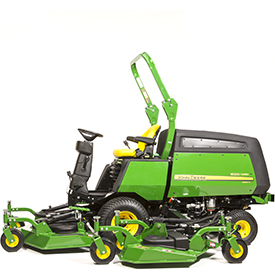 1600 Turbo Series III WAM side view
1600 Turbo Series III WAM side view
 Deluxe air-intake system
Deluxe air-intake system
-
Deluxe air-intake system
-
Hood that is composed of a large, black, cross-link polyethylene-composite center section with green, metal side panels
- The composite center section includes air-intake screens and helps to guide the cooler air from above the machine to the radiator. The design provides a uniform distribution of clean air, as well as minimizing the amount of chaff collection on the exterior screens.
-
Additional sealing around the operator station reduces the amount of hot air blowing on the operator, which in turn improves operator comfort.
- The rear bumper helps with hood sealing and reduces the potential for rear hood damage.
22 gal. (83.3 L) of fuel on board, plenty for a long day of mowing
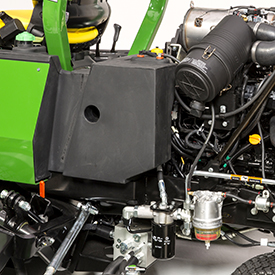 Fuel tank
Fuel tank
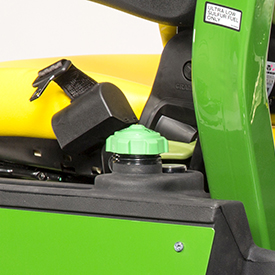 Large fuel fill opening
Large fuel fill opening
The operator can fill the fuel tank without removing the hood. The fuel tank capacity is 22 U.S. gal. (83.3 L) for all-day mowing.
Mower decks have many performance and convenience features
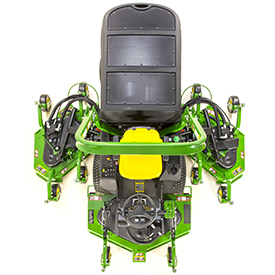 Wide-area mower (WAM) top view
Wide-area mower (WAM) top view
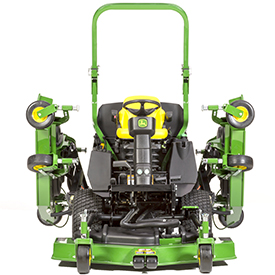 WAM front view with side mowers raised
WAM front view with side mowers raised
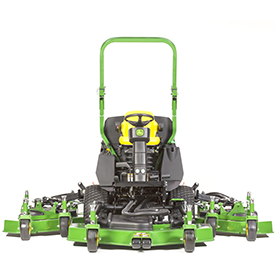 128 in. (325.1 cm) with both wings down
128 in. (325.1 cm) with both wings down
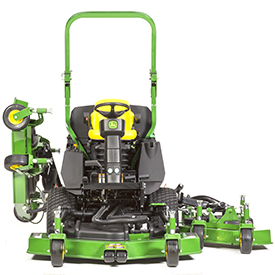 94 in. (238.8 cm) with center deck and either side deck down
94 in. (238.8 cm) with center deck and either side deck down
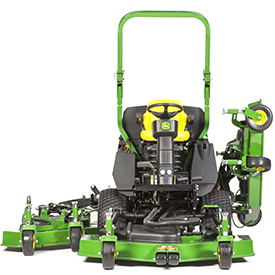 Front and side mowing
Front and side mowing
 62 in. (157.5 cm) with center deck only
62 in. (157.5 cm) with center deck only
The 1600 Turbo Series III WAM is equipped with a 62-in. (157.5-cm) center deck and two 42-in. (106.7-cm) wings. Cutting widths are 128 in. (325.1 cm) using all three decks, 94 in. (238.8 cm) using the center deck and either wing deck, and 62 in. (157.5 cm) with the center deck only. All decks are rear discharge. Wings fold for transport and reduce the machine’s width to a narrow 84 in. (213 cm), so it can easily be driven along golf-cart-size paths or fit on a trailer. The wing decks will float 45 degrees above horizontal and 20 degrees below horizontal, following the ground contour.
 Underside of 62-in. (157.5-cm) deck
Underside of 62-in. (157.5-cm) deck
 Side view of 42-in. (106.7-cm) deck
Side view of 42-in. (106.7-cm) deck
All decks have a unique baffling system that reduces clumping and provides even clipping dispersal for exceptional appearance.
Features common to these rear-discharge mower decks include:
-
Mower decks are fabricated from 7-gauge, 0.179-in. (4.6-mm) steel, the thickest in the industry; strength has been designed into the 1600 Turbo Series III WAM mower decks for increased reliability
- A 3/4-in. (1.9-cm) solid bar runs along the entire mower deck perimeter for added strength
- Dual-range height of cut spans 1 in. (2.54 cm) to 5.5 in. (14 cm) in 0.5-in. (1.27-cm) increment adjustments
- Wing deck float of 45 degrees upward and 20 degrees downward provides excellent cut quality when mowing undulating terrain
- Each wing deck has four caster wheels to follow ground contour and provide unmatched cut quality
- Unique baffling system produces even grass dispersal for superior appearance
Patented impact-absorbing system
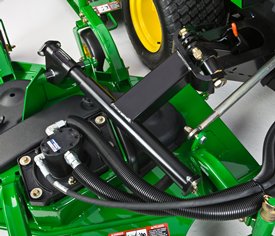 Patented impact-absorbing system
Patented impact-absorbing system

A patented impact-absorbing system is provided:
- This exclusive feature allows the wing decks to move rearward and inward when contacting obstructions such as trees, curbs, or other solid objects to prevent damage.
- Mowers are safety certified (meaning that mowers have been evaluated by the manufacturer [John Deere Turf Care] and conform to American National Standards Institute [ANSI] B71.4 Safety Certification Specifications for Commercial Turf Care Equipment).
Mow valve
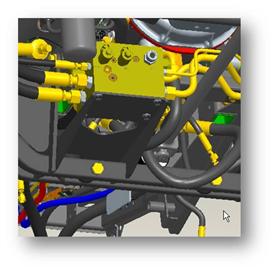 Mow valve
Mow valve
The mow valve controls the hydraulic flow to the wing deck circuits.
Isolated deck motor design
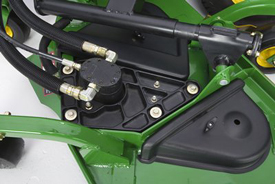 Isolated deck motor design
Isolated deck motor design
The isolated deck motor design consists of three cast-iron mounting structures for the deck motors. Rubber isolators that are similar to engine mount isolators are located between the castings and the deck shell brackets.
The rubber isolators allow the castings to flex relative to the deck shell. The addition of the isolators stops the vibration path between the hydraulic motor and the deck shell, thus preventing the amplification of sound by the deck shell.
Deck motors
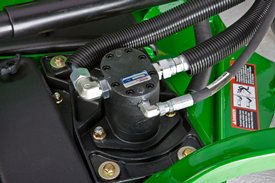 Deck motor
Deck motor
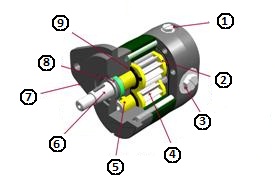 D Series deck motor
D Series deck motor
- Radial case drain
- Pressure balanced bronze-on-steel thrust plates
- Flexible configuration of shaft, flange, and ports
- One-piece steel gears with 12-tooth profile
- Heavy-duty, low-friction sleeve bearings
- Integrated dust protector
- High-strength ductile iron body and covers
- High-temperature Viton® rubber shaft seals
- Figure 8 monolithic high-temp load seals
The deck motors are capable of withstanding high pressure requirements for all-day mowing. Motors have Viton seals, which can withstand higher hydraulic temperatures. The motor contains a dust seal to help eliminate debris from entering into the hydraulic connections.
Lift valve
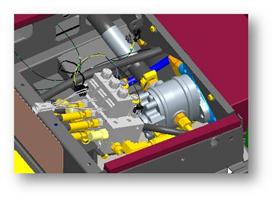 Lift valve
Lift valve
The lift valve controls the cylinders that lift and lower the decks. It also controls the axial piston deck-motor pump (turns it on and off).
Mower mulch kit available
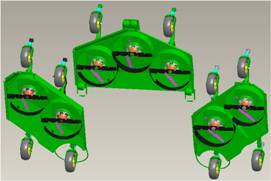 WAM mulch kit illustration
WAM mulch kit illustration
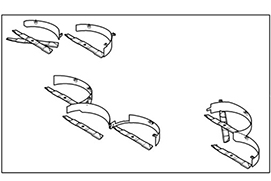 WAM mulch kit illustration
WAM mulch kit illustration
A mulch kit is available as an attachment for field conversion. The mulch kit includes unique mulch blades, baffles, and a deflector shield to produce smaller clippings, which decompose faster than un-mulched clippings. Operators should follow the one-third rule when mulching grass.
This mulch kit also does an excellent job when mulching leaves.
BTC10335 TriCycler Mulching Kit
NOTE: Applicable for serial numbers starting with 1TC1600TPBT100007 and higher, model year 2012 and newer.
Viton is a trademark of The Chemours Company.
Features are provided for convenient transport
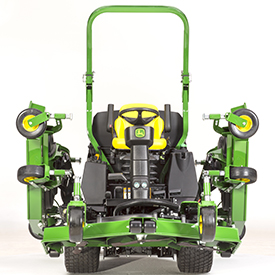 Wing decks raised
Wing decks raised
The wing decks rise to a narrow 84-in. (213.4-cm) width and can be locked into transport position. A machine transport speed of 15 mph (24.1 km/h) means the operator can spend less time transporting and more time mowing.
NOTE: The power take-off (PTO) can be engaged while in the transport position.
Proper trailering strap areas
Fasten the machine to the trailer with heavy-duty straps, chains, or cables. Fasten the rear strap to the tow loop behind the rear axle. Fasten the front strap to tie down holes on the operator's platform. Both the front and rear straps must be directed down and outward from the machine.
Bumper
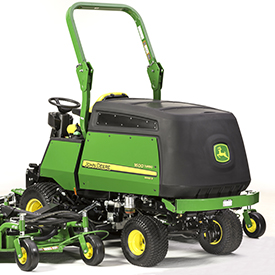 Rear bumper
Rear bumper
The rear, frame-mounted bumper provides for excellent rear protection and effective hood sealing for engine cooling.
To operate, pull out on the bottom of the engine cover latches on the left and right side of machine behind the operator’s seat. Unhook the tops of the engine cover latches from the hooks on the engine cover. Push down on the bumper lever and rotate the bumper to the right side of the machine.
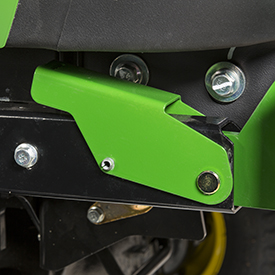 Rear bumper latch in locked position
Rear bumper latch in locked position
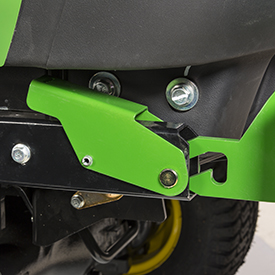 Rear bumper latch in unlocked position
Rear bumper latch in unlocked position
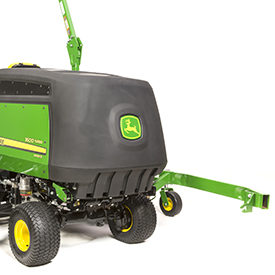 Rear bumper in open position
Rear bumper in open position
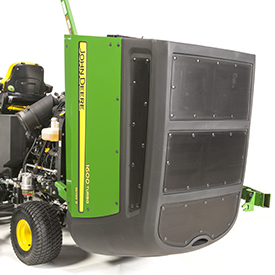 Engine cover open
Engine cover open
Maximum productivity with hydrostatic transmission and transaxle
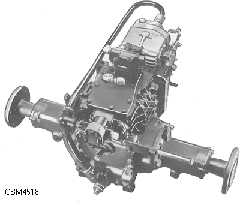 Hydrostatic transmission
Hydrostatic transmission
A hydrostatic transmission is used for reliable operation.
Durability features include:
- Large, forged, one-piece trunnion shaft with large support bearings to reduce vibration and noise
- Charge pump used to efficiently deliver oil to the transmission
- Oil cooler to cool transmission oil for longer transmission life
- Pressure-side filtration to allow use of a finer mesh (10 micron filter) than suction filtration systems
High-range/low-range transaxle allows the following:
-
High range has maximum speed of 15 mph (24.1 km/h) for faster transport. Power take-off (PTO) can be engaged for mowing in high range.
- Low range has a maximum speed of 9 mph (14.5 km/h). The wide-area mower (WAM) can mow in both low and high range.
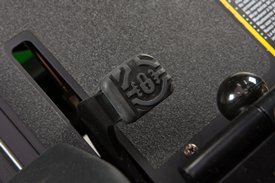 Differential lock
Differential lock
The differential lock is standard equipment:
- It locks both the front drive wheels together for extra traction, when needed.
- Conveniently located pedal allows the operator to engage the differential lock.
Planetary final drive and wet-disc brakes ensure durability and long life
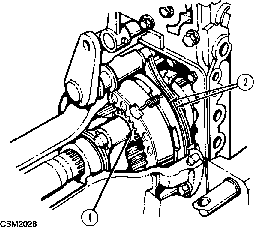 Planetary final drive/wet-disc brakes
Planetary final drive/wet-disc brakes
The planetary final drive (label 1 in the drawing) does the following:
- Evenly distributes stress load for long life
- Has heavy-duty drive axles for extra durability
Wet-disc brakes (label 2 in the drawing) do the following:
-
Provide positive stopping power and long life
- Require minimal adjustment
- Include individual turn brakes as standard
Mechanical rear-wheel drive
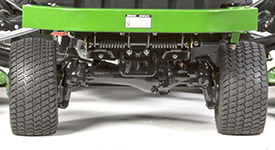 1600 Turbo Series III Wide-Area Mower (WAM) mechanical rear-wheel drive axle
1600 Turbo Series III Wide-Area Mower (WAM) mechanical rear-wheel drive axle
Two-function mechanical rear-wheel drive is standard equipment:
- On-demand four-wheel drive (4WD) automatically engages and disengages as needed. The machine operates in two-wheel drive (2WD) until front-wheel slip is detected. If front-wheel slip is detected, the machine then automatically engages 4WD in the forward direction.
-
Constantly maximizes trimming ability
-
Better fuel economy than full-time 4WD
-
Less steering tire wear than full-time 4WD
-
Increases traction and trimming ability to allow a novice operator to mow like an expert
-
Works in the forward direction only
-
-
Full-time 4WD is on only when shifted into position by the operator.
-
Can be engaged or disengaged on the go
-
Provides maximum traction and flotation in difficult operating conditions
-
Works in reverse as well as the forward direction
-
Factory-installed, four-post rollover protective structure (ROPS) order option
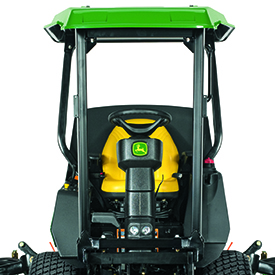 Four-post ROPS
Four-post ROPS
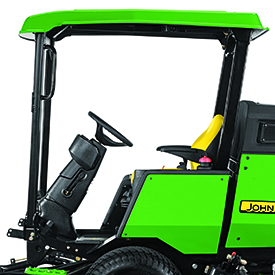 Four-post ROPS side view
Four-post ROPS side view
Due to the high percentage of operators who prefer the four-post ROPS canopy, a factory-installed option is available. The rear ROPS structure is a black fixed two-post ROPS.
The ROPS comes standard with a canopy and assembles to the 1600 Turbo Series III Wide-Area Mower (WAM) along with a two-post
Roll-Gard™ ROPS.
The four-post ROPS structure includes the following:
- Two front posts
- Rear ROPS
- Welded top and bottom assemblies
- Molded canopy
The four-post ROPS provides the ability to meet bid requirements that call for a four-post ROPS and offers the ability to use a weather enclosure. It also meets the International Organization for Standardization (ISO) 21299 standard.
Standard high-back, air-ride seat provided for operator comfort
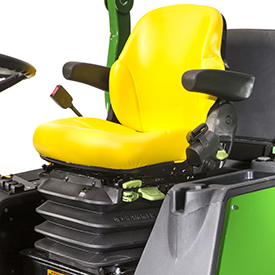 High-back, air-ride seat
High-back, air-ride seat
An air-ride suspension seat is standard equipment and provides maximum operator comfort across a wide range of operator traits. Key adjustments include the following:
- Weight and height adjustment allow for proper ride and suspension height.
- Fore-aft sear slide adjustment helps account for a wide range of heights.
- Fore-aft suspension travel to improve directional changes during operation.
- Back angle tilt adjustment is available for the back portion of the seat.
- Lumbar adjustment provides proper back support.
- Standard, adjustable armrests are made of a durable material that provides adequate support and surface area for the operator's arms.
- High seat-back profile features body-contoured seat cushions.
- Cushions are ideal for those who seek proper back support. The highly-resilient contoured foam construction allows for all-day mowing comfort.
- A raised seat ensures a commanding view to the front and side mower decks.
- The retractable seat belt is convenient to use.
The comfortable seat, along with ample legroom in the operator's platform, convenient pedal locations, and adjustable steering column make operator comfort on the John Deere 1600 Turbo Wide-Area Mower among the best in the industry.
The standard air-ride seat with adjustable armrests is designed with comfort, safety, and ergonomics in mind, ensuring relaxed, healthy sitting for hours on end.
The standard high-back, air-ride seat has many high-quality features:
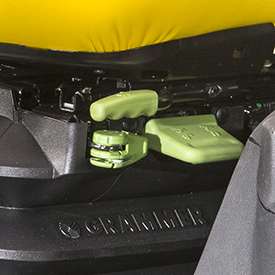 Fore-aft lever
Fore-aft lever
- Adjustments are provided for operator armrests, lumbar support, and back angle, and air suspension is adjustable for the operator’s weight and ride.
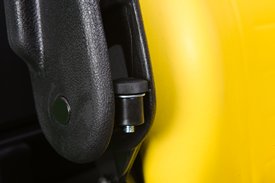 Armrest adjustment
Armrest adjustment
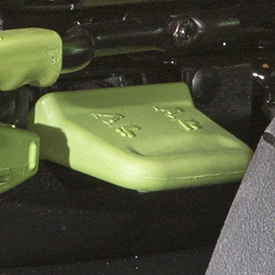 Air-ride seat adjustment
Air-ride seat adjustment
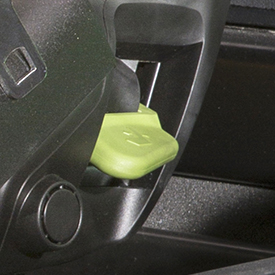 Back-angle adjustment
Back-angle adjustment
The armrests are standard and the seat pads are replaceable.
Controls and instrumentation are convenient and easy to find
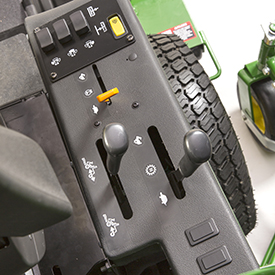 Control console
Control console
Low-effort controls are conveniently grouped on the right-hand side.
The finger-touch controls are:
- Left mower deck lift/lower switch
- Front mower deck lift/lower switch
- Right mower deck lift/lower switch
- Electronically-controlled throttle lever
- Electronically-activated power take-off (PTO) switch
- Speed-range lever for high, neutral, and low range
- Four-wheel drive (4WD) lever
Hydrostatic power steering
- Makes it easy to turn the machine, reducing operator fatigue
- Allows quick steering action, two and a half turns lock-to-lock, for excellent maneuverability
Two-pedal foot controls
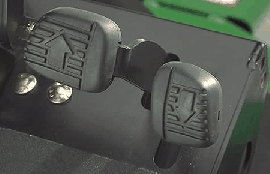 Two-pedal foot controls
Two-pedal foot controls
- Convenient two-pedal hydrostatic control system
- Allows the operator to select speed and direction with just a touch of the toe while resting heel on platform
- Twin Touch™ pedal design that allows the operator to change direction without having to lift his foot off the platform
- Large pedal surface, which provides increased operator comfort
- Keeps both hands free for steering and operating controls
Standard turning brakes
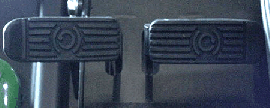 Standard turning brakes
Standard turning brakes
The individual brakes can be applied by the operator as a traction aid or to reduce the turning radius.
Master stop brake
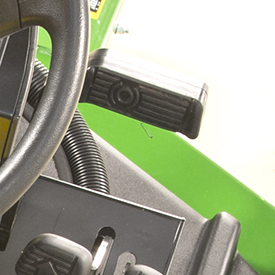 Master stop brake
Master stop brake
-
Brake is easy to use.
-
Push-pull-type parking brake release allows the operator to simply pull out the knob and depress the foot brake to engage. To disengage, simply push the foot brake pedal and push the knob in to initiate release.
- Brake provides stopping power to both drive wheels.
- The stop brake is used for a parking brake.
Differential lock
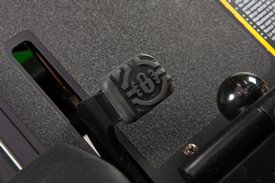 Differential lock
Differential lock
- Locks both front drive wheels together for added traction
- Increases traction and flotation in poor traction conditions
The differential lock is located on the left side of the platform; this allows for easy use of the Twin Touch foot pedals (on the right side) while engaging the differential lock at the same time.
High/low range lever
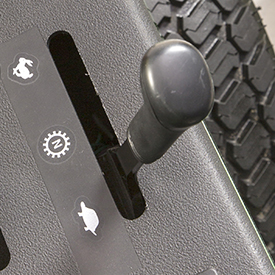 High-/low range lever
High-/low range lever
- The high-/low range lever allows the operator to select the desired speed range.
- The machine must be stopped to shift between ranges.
- Shifting to the neutral position allows the operator to by-pass the hydraulic drive for towing.
4WD lever
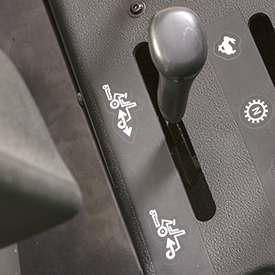 4WD lever
4WD lever
- The 4WD lever allows the operator to engage 4WD in reverse. 4WD is automatically engaged when wheel slip occurs in forward drive.
Electronic cruise control
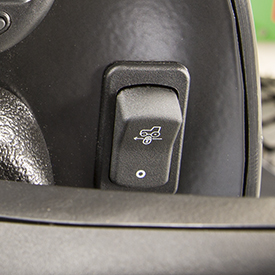 Electronic cruise control
Electronic cruise control
- Beneficial when mowing open areas or when transporting
- Located on the steering column
Cruise control operation
- To engage, simply push forward on the cruise control switch and hold until the foot is removed from the forward pedal.
- For an emergency stop, cruise can be released by pushing on the master brake pedal or turning the cruise control switch off.
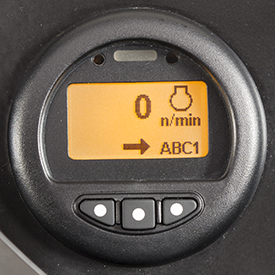 Engine rpm screen
Engine rpm screen
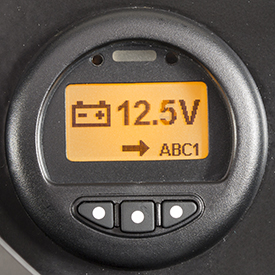 System voltage screen
System voltage screen
Tilt steering
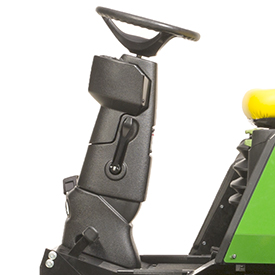 Tilt steering
Tilt steering
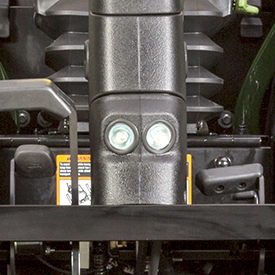 Headlights
Headlights
- Allows the operator to adjust the steering column to the most comfortable position and provides additional clearance for entry to the operator station
- Standard 20-W halogen headlights are located low in the column for the best illumination
Mower deck lift switches
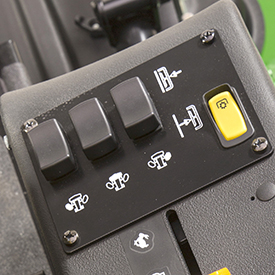 Mower deck lift switches
Mower deck lift switches
The mower deck switches allow the operator to vary mowing widths, engage and disengage the wing-deck blades, and service and transport the machine.
Easy-to-view operator instrumentation
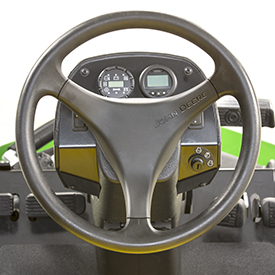 Instrumentation from seat
Instrumentation from seat
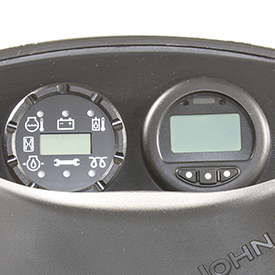 Instrumentation panel
Instrumentation panel
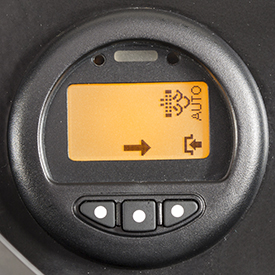 Diesel particulate filter screen
Diesel particulate filter screen
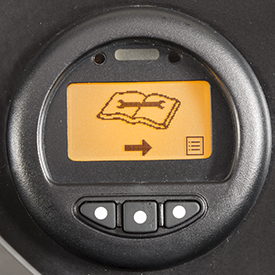 Service menu screen
Service menu screen
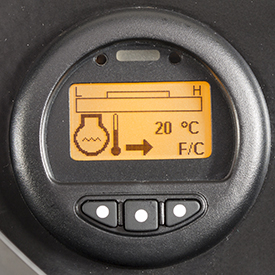 Engine coolant temperature screen
Engine coolant temperature screen
An instrument panel is located on the steering column for both operator convenience and safety.
Instrumentation includes:
Hourmeter
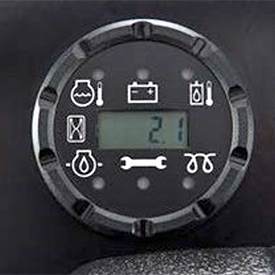 Hourmeter
Hourmeter
- Located on the steering column for easy viewing
- Records the number of hours the engine has run
- Used along with the periodic service chart (located in the engine compartment) to determine when service procedures need to be performed on the machine and mower deck
Engine glow plug light
The engine glow plug light indicates the intake manifold heater is energized. The operator should wait until the glow plug light goes off before starting the engine.
- The manifold heater is controlled by a temperature-sensitive timer and turns off sooner in warm weather.
- Starting the engine before the indicator turns off wastes fuel, creates smoke, and puts unnecessary wear on the starter.
- If the starter does not engage when the key switch is turned to the start position, one of the start conditions has not been met. Trouble codes are presented as a sequence of flashes and pauses that must be counted and converted to a two digit number:
- One flash, a short pause, and two flashes – operator attempted to start the machine without the park brake locked and the operator is off of the seat (one of these conditions must be met for the starter to engage).
- One flash, a short pause, and three flashes – operator attempted to start the machine with the power take-off (PTO) engaged.
- Two flashes, a short pause, and one flash – hydrostatic pedals are not centered in the neutral position.
Engine coolant temperature light
The engine coolant temperature light indicates the engine is overheating. A warning beeper also sounds when the light comes on.
Engine oil pressure light
The engine oil pressure light indicates the engine oil pressure is low. The indicator should be lit as a test to make sure it is working when the key switch is turned to the run position. A warning beeper sounds when the light comes on. The light (and beeper) should go off once the engine starts.
Battery discharge light
The battery discharge light indicates the battery is not getting enough charge from the alternator. The light should come on when the key switch is turned from off to run. The light should go off once the engine starts.
Primary display unit (PDU) navigation
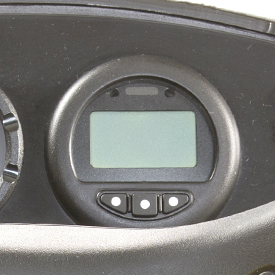 Primary display unit
Primary display unit
The PDU utilizes three buttons for navigation.
The display’s top-level screens can be cycled through by pressing the center button.
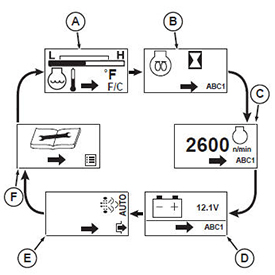 Operator screens
Operator screens
Top level screen functions are as follows:
A - Engine coolant temperature (ECT) screen
B - Pre-heat countdown (HPH) screen
C - Engine rpm (Erpm) screen
D - System voltage (SV) screen
E - Diesel particulate filter (DPF) screen
F - Service menu (IServ) screen
The top-level screens are shown in order of display. To navigate to next top-level screen, press the center button on the PDU. For more information on the different functions, please refer to the machine’s operator’s manual.
Tool tray and cup holder for operator convenience
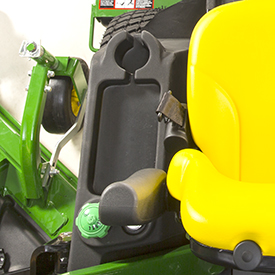 Tool tray and cup holder
Tool tray and cup holder
Tool tray and cup holder are convenient for the operator to get to:
- Quick access to a drink and tools on the machine decreases downtime.
Power take-off (PTO) drive provides control and power
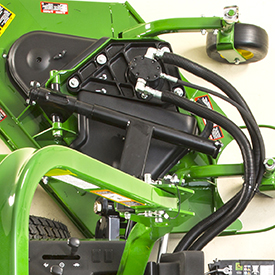 Hydraulic PTO drive
Hydraulic PTO drive
Mower decks are hydraulically driven using a separate closed-loop system with one gear-type motor for each deck:
- Mowers are designed to provide increased torque to the decks for additional power and productivity in tough mowing conditions.
- The operator can raise one or both of the wing decks and all hydraulic power will be directed to the center deck (exclusive John Deere feature) to provide maximum hydraulic pressure for extreme conditions.
- Blades are belt-driven from each deck motor.
Safety starting system
The 1600 Turbo Series III Wide-Area Mower (WAM) has an operator-presence system.
In order to start the engine, the following must be met:
- The hydrostatic foot controls must be in neutral.
- The power take-off (PTO) must be disengaged.
- The operator must be in the seat or the parking brake must be set.
- The ignition key must be used.
In addition, once the engine is running, an interlock automatically shuts the engine and PTO off if the operator leaves the seat. To keep the engine running, the operator must disengage the PTO and set the parking brake before dismounting.
Specifications
- Additional information - Date collected: 12-Oct-2017
- Anti-scalp rollers - Front deck caster wheels: Two, 11x4-5, flat-free
- Anti-scalp rollers - Type: Flat-free
- Anti-scalp rollers - Wing deck caster wheels: Four, 11x4-5, flat-free
- Blades - Blade length: 22 in.<br/>55.88 cm
- Blades - Blade thickness: 0.312 in.<br/>0.79 cm
- Blades - Blade tip speed: 13,000 fpm<br/>3,962 m/min
- Blades - Blade width: 2.5 in.<br/>6.35 cm
- Blades - Interchangeable mower blades between all decks: Yes
- Blades - Total mower blades: Seven, three center and two each side
- Brakes - Parking brakes: Hand brake
- Brakes - Steering brakes: Standard
- Brakes - Type: Internal, wet disc
- Buyer's notes - Certification: ANSI B71.4
- Buyer's notes - Warranty: 24 months
- Controls - Circuit: Series
- Controls - Deck drive pump: Displacement, axial piston pump, 2.48 cu in.<br/>40.6 cc
- Controls - Deck motor: Type<br/>Hydraulic, open center, closed loop<br/>Displacement, gear motor, 2.5 cu in.<br/>41 cc
- Controls - Forward/reverse: Two-pedal
- Controls - Indicator lights: Engine air heater, oil pressure light, engine temperature light, fuel gauge, hydraulic oil temperature light
- Controls - Mower lift: Three two-function switches
- Controls - Park brake: Foot pedal/disk
- Controls - PTO engagement: Type<br/>Hydraulic, independent<br/>Electric solenoid switch
- Controls - PTO engagement/disengagement: Electric solenoid
- Controls - Throttle: Hand
- Dimensions - Ground clearance: 6.5 in.<br/>16.5 cm
- Dimensions - Height with ROPS: ROPS up, 98 in.<br/>249 cm<br/>ROPS down, 74 in.<br/>188 cm<br/>With four-post canopy ROPS, 82 in.<br/>208 cm
- Dimensions - Length (with deck): 132 in.<br/>335 cm
- Dimensions - Machine weight without the deck: 3,264 lb<br/>1,474.2 kg
- Dimensions - Transport width: 84 in.<br/>213 cm
- Dimensions - Tread width: 52 in.<br/>131 cm
- Dimensions - Vehicle weight: 4,173 lb<br/>1,892.8 kg
- Dimensions - Wheel base: 60 in.<br/>152 cm
- Dimensions - Width with decks down: 134 in.<br/>340 cm
- Drivetrain - 4 wheel drive: On demand or full time
- Drivetrain - 4 wheel drive type: Mechanical rear-wheel drive
- Drivetrain - Differential lock: Mechanical, foot activated
- Drivetrain - Final drive: Planetary
- Drivetrain - Transaxle: Tuff Torque (Kanzaki)
- Drivetrain - Transaxle type: Dual range
- Drivetrain - Transmission: Hydrostatic
- Electrical - Alternator: 75 amp
- Electrical - Battery cold crank amps: 675 CCA
- Electrical - Battery voltage: 12 V
- Electrical - Charging system: Automotive type
- Electrical - Starter size: 1.9 hp<br/>1.4 kW
- Engine - Air cleaner: Dual element, dry type
- Engine - Air restriction indicator: Standard, progressive type
- Engine - Bore and stroke: 3.4x3.5 in.<br/>86x90 mm
- Engine - Compression ratio: 19:01
- Engine - Cooling: Liquid-cooled water centrifugal
- Engine - Cooling system capacity: 2.5 U.S. gal.<br/>7.5 L
- Engine - Crankcase capacity: 6.1 U.S. qt<br/>5.8 L
- Engine - Cycle: Four
- Engine - Cylinders: Four
- Engine - Displacement: 127.6 cu in.<br/>2.091 L<br/>2,091 cc
- Engine - Engine shutoff: Key
- Engine - Injection: Direct
- Engine - Lubrication: Pressurized by lobe-style pump
- Engine - Max Torque per SAE J1349 (net continuous): 117.3 lb-ft<br/>159 Nm
- Engine - Model: 4TNV86CT-DJWM (T4)
- Engine - Oil filter: Spin-on
- Engine - Operating range: With isochronous governor 1,400-3,030 rpm
- Engine - Operating torque (net continuous @ 3000 rpm): 103 lb-ft<br/>140 Nm
- Engine - Power: Gross power SAE J1995 at 3,000 rpm, PS 60 hp<br/>44 kW
- Engine - Radiator fins per inch: 10 fins per inch
- Engine - Radiator location: Rear mounted
- Engine - Rated engine speed: 3,000 rpm
- Engine - Starting aid: Engine glow plug
- Frame - Frame type: Welded, tubular steel
- Frame - Thickness: 11 gauge<br/>0.12 in.<br/>3 mm
- Fuel consumption - Full load: 3.33 U.S. gal./hr<br/>12.7 L/hr
- Fuel consumption - One-half load: 1.93 U.S. gal./hr<br/>7.31 L/hr
- Fuel system - Cold start device: Increased timing for better cold starting
- Fuel system - Fuel filter: Replaceable, spin-on type
- Fuel system - Fuel neck opening: 3 in.<br/>7.6 cm
- Fuel system - Fuel pump type: Mechanical
- Fuel system - Fuel tank capacity: 22 U.S. gal.<br/>83.3 L
- Fuel system - Fuel tank location: Left side of the machine
- Fuel system - Fuel transfer pump: Electric
- Fuel system - Fuel type: Diesel
- Fuel system - Self bleeding: System is self-bleeding because of the electric fuel transfer pump
- Fuel system - Water separator: Replaceable, 100-mesh element
- Hydraulic system - Hydraulic reservoir capacity: 14 U.S. gal.<br/>53 L
- Hydraulic system - Implement relief: 1,600 psi
- Hydraulic system - Motor: Displacement, axial piston pump, 2 cu in.<br/>33 cc
- Hydraulic system - Steering relief: 1,087 psi
- Hydraulic system - Traction drive pump: Displacement, axial piston pump, 3 cu in.<br/>49 cc
- Hydraulic system - Type: Closed loop, hydrostatic
- Implement lift - Lift cylinders: Bore 2 in.<br/>50.8 mm
- Implement lift - Pump: Gear
- Implement lift - Type: Hydraulic, open center
- Key Specs - Blade tip speed: 13,000 fpm<br/>3,962 m/min
- Key Specs - Caster wheels: Four, 11x4-5, flat-free<br/>Two, 11x4-5, flat-free
- Key Specs - Drive tires: 26x12-12
- Key Specs - Engine Manufacturer/model: 4TNV86CT-DJWM (T4)
- Key Specs - Engine Power: Gross power SAE J1995 at 3,000 rpm, PS 60 hp<br/>44 kW
- Key Specs - Fuel tank capacity: 22 U.S. gal./hr<br/>83.3 L
- Key Specs - Mower deck Size: 62, 94, 128 in.<br/>157, 239, 325 cm
- Key Specs - Speed range: 0-15 mph<br/>0-24 km/h
- Key Specs - Transmission: Hydrostatic
- Key Specs - Warranty: 24 monhs
- Mower decks - Blade drive: C-section, V-belt
- Mower decks - Center deck cutting width: 62 in.<br/>157 cm
- Mower decks - Deck circuit: Series
- Mower decks - Deck construction: Fabricated steel
- Mower decks - Deck drive type: Hydraulic, closed loop
- Mower decks - Deck thickness: 7 gauge<br/>0.18 in.<br/>4.6 mm
- Mower decks - Discharge: Rear
- Mower decks - Energy-absorbing wing decks: Yes
- Mower decks - Height-of-cut range: 1-5.5 in.<br/>2.5-13.9 cm
- Mower decks - Size: 62, 94, 128 in.<br/>157, 239, 325 cm
- Mower decks - Spindle bearings greaseable: Yes
- Mower decks - Spindles: Heat treated, diameter, 1 in.<br/>2.54 cm
- Mower decks - Transport lock: Standard
- Mower decks - Wing deck cutting width: 42 in.<br/>107 cm
- Mower decks - Wing deck float: Up (while maintaining PTO engagement)<br/>45 degrees<br/>Down (while maintaining PTO engagement)<br/>20 degrees<br/>
- Mowing rate - 80% field efficiency: 85% field efficiency at 10 mph<br/>16 km/h<br/>11 acres/hr
- Operator station - Safety: Safety interlock and operator presence system
- Operator station - Seat: Adjustment positions<br/>Multi<br/>Armrests<br/>Yes, adjustable<br/>Air-ride suspension seat, adjustable, deluxe, high-backed, back angle adjustment, lumbar adjustment, standard armrests
- ROPS - Type: Standard two-post folding ROPS or four-post canopy ROPS meets ISO21299 standard
- Sound level (without cab) - With deck: 94 dBA
- Sound level (without cab) - Without deck: 89 dBA
- Steering - Tilt steering wheel: Standard
- Steering - Turning radius: 39 in.<br/>99 cm
- Steering - Turns lock-to-lock: 2.5
- Steering - Type: Power, hydrostatic
- Tires - Drive tires: Pressure<br/>30 psi , 206.8 kPa (front)<br/>28 psi, 193.1 kPa (rear)<br/>26x12-12
- Tires - Ply rating: 6 PR (both)
- Tires - Steering tires (rear): 18x9.5-8
- Tires - Tread: Multi-trac
- Travel speed - High forward speed: 0-15 mph<br/>0-24 km/h
- Travel speed - High reverse speed: 0-7.5 mph<br/>0-12 km/h
- Travel speed - Low forward speed: 0-9 mph<br/>0-14.5 km/h
- Travel speed - Low reverse speed: 0-4.5 mph<br/>0-7.2 km/h
- Travel speed - Speed range: 0-15 mph<br/>0-24 km/h
Features
-
Deck Options: 7-gauge steel deck
62 in. center, (2) 42 in. wings
Rear discharge - HP: 60.0 hp
- Fuel Options: Diesel
- Features: B20 Compatible
Copy Set
Exclusive air-intake system draws clean air from the top of the machine for consistent cooling
 Air-intake system
Air-intake system
 High-capacity cooling system
High-capacity cooling system
An innovative, exclusive air-intake system draws clean air from the top of the machine instead of the rear. This keeps the radiator cleaner and prevents the engine from overheating.
The high-capacity cooling system combines the radiator and hydraulic oil cooler.
Excellent performance from high-traction tires and low-maintenance caster tires
 Tires
Tires
Large, 18x9.5-8 steering (rear) and 26x12-12 (front) drive tires provide excellent traction and flotation. Both tires have a six-ply rating.
Caster tires
 Caster tire
Caster tire
Semi-pneumatic mower deck caster tires are standard equipment. Benefits provided by semi-pneumatic tires include:
- Looks and performs like a rubber air-filled tire
- No flats means reduced downtime
- Reduces maintenance time and expense
- No need to worry about inflating caster tires ever again
- Reduced incidents of caster tires rolling off of the rim
- Semi-pneumatic tires never need air maintenance, nor will they become flat when punctured, making them truly flat-free
Serviceability is designed-in to reduce maintenance cost and increase uptime
 Hood and seat platform open for excellent access
Hood and seat platform open for excellent access
 Overhead view
Overhead view
The hood and seat platform open for excellent access to the engine and drivetrain. All daily service points are located on the left side of the machine:
- Fuel fill
- Engine oil check
- Engine oil filter
- Hydraulic oil fill
- Hydraulic oil filter
- Air filter restriction indicator
- Engine coolant check
 Front deck raised 70 degrees
Front deck raised 70 degrees
 Wing deck raised 90 degrees
Wing deck raised 90 degrees
The wing decks raise 90 degrees, and the front deck raises 70 degrees for excellent access.
No tools are required to access the mower deck belts.
Diagnostic control module
 Control module
Control module
 Fuse box
Fuse box
The diagnostic control module features light-emitting diode (LED) lights and a heartbeat to aid in diagnostics and lead the technician to the proper circuit. Each switch on the machine has its own LED light on the controller, so input and output functions can be diagnosed by observing the appropriate lights.
Service ADVISOR™ diagnostics system
 Diagnostic port
Diagnostic port
Service ADVISOR is a John Deere dealership tool capable of providing technical and machine support for technicians and service managers using a laptop computer. It provides symptom-based diagnostics information, machine information, electronic technical information, and connection to John Deere through an extranet at workshops and in the field.
A data port outlet socket is provided on the right-hand instrument panel next to the diagnostic control module console to access important service information with a laptop computer equipped with Service ADVISOR software. Service ADVISOR reduces downtime by allowing technicians to quickly identify the root cause of problems, aid them in identifying the component needing repair, and aid them in the repair procedures. It also significantly reduces the amount of printed materials the technician is required to have at their disposal to perform the repair or maintenance work.
Quick-access foot panel for easy access
 Quick-access foot panel
Quick-access foot panel
The foot panel is easily removed to allow quick and easy access to service points.
Two-post folding Roll-Gard™ rollover protective structure (ROPS)
 Two-post Roll-Gard ROPS
Two-post Roll-Gard ROPS
 ROPS folded down for clearance
ROPS folded down for clearance
The two-post folding Roll-Gard ROPS and seat belt are standard equipment:
- When used in combination with seat belts and safe operating practices, the ROPS is effective in reducing serious injuries and death from rollover accidents.
The standard-equipment Roll-Gard ROPS can be folded to allow for additional clearance when needed. With the ROPS in the folded-down position, the machine fits under a standard doorway.
The ROPS meets the International Organization for Standardization (ISO) 21299 ROPS standard – defined test procedures and acceptance criteria for the rollover protective structures of powered ride-on turf care machinery. Under the support of the Outdoor Power Equipment Institute (OPEI), a panel was formed that brought together an international group of ROPS experts that presented the best-learned practices regarding off-highway vehicle operator crush protection. The result of this undertaking is a standard dedicated to protecting operators of powered ride-on turf maintenance equipment.
The ROPS can be folded down without tools for operation under tree canopies or in other confined operating spaces. Operators should leave the ROPS in the upright position for all other mowing:
- The folding ROPS enhances operator safety and still provides clearance when loading on enclosed trailers.
Folding the ROPS is simple - remove two pins and rotate the top of the Roll-Gard ROPS down. Adjustments can be made from the operator's station.
The folding ROPS performance is certified at the date of manufacture, per the following standard:
- ISO 21299
Powerful turbocharged diesel engine for superior performance
 1600 Turbo Series III Wide-Area Mower (WAM) engine
1600 Turbo Series III Wide-Area Mower (WAM) engine
 1600 Turbo Series III WAM engine
1600 Turbo Series III WAM engine
The 1600 Turbo Series III WAM is powered by a liquid-cooled, turbocharged, four-cylinder, 60-hp (44.7-kW) at 3000 rpm, PS diesel engine.
Engine features include:
- 117.3 lb-ft (159 Nm) of torque at 3000 rpm for extra lugging power on hills and in tough mowing conditions
- Large 127.6-cu in. (2.091-L) displacement, which produces the torque needed to handle hills and tough mowing conditions
Engine is a 16-valve (four valves per cylinder, two intake and two exhaust) design:
- Cold-start device to increase engine timing for improved cold starting
- Full-pressure lubrication for positive lubrication with continuous operation on slopes
- Dual-element air filter that is completely sealed for effective cleaning
 Air filter with air-restriction indicator
Air filter with air-restriction indicator
 Air-restriction indicator
Air-restriction indicator
- Progressive-type air-restriction indicator to let operator know when the filter needs servicing
- Automotive-type alternator (75 amp) that provides plenty of charge to the battery
- Glow plugs for quick starting in cold weather
- Automotive sensing system, which tells the operator when the engine is ready to start
- Isolated engine mounting, which reduces engine vibration in the operator's station for more comfortable operation
Direct fuel injection
- Injects fuel directly on top of pistons for more efficient combustion, less emissions
- Delivers more power per gallon of fuel
- Quicker starting and quieter operation
- Designed to meet California emission standards
- Features low levels of exhaust and emissions and excellent fuel economy. It meets the necessary Environmental Protection Agency (EPA) Tier 4 standard and meets 97/68/EC EU non-road mobile machinery (NRMM) emissions regulation
- Electronic engine control and cooled exhaust gas recirculation (EGR) system
- High-pressure common fuel rail for lower emissions and improved engine responsiveness
Flow of exhaust during engine operation
- Exhaust airflow enters into the EGR cooler from the exhaust manifold near the turbocharger
- Cooler takes hot exhaust gases and cools them to where the temperature will not have excessive impact on combustion efficiency
- Based on load, air temperatures, and rpm, the engine control unit (ECU) opens (or closes) the EGR valve, allowing exhaust gases into the intake manifold. The gases mix with the rest of the incoming air from the turbocharger and aftercooler.
Other engine features:
- Overhead valve (OHV) for efficient combustion
- Liquid-cooled for more consistent operating temperatures
- Closed crankcase ventilation that burns crankcase hydro-carbon evaporation
 1600 Turbo Series III WAM side view
1600 Turbo Series III WAM side view
 Deluxe air-intake system
Deluxe air-intake system
-
Deluxe air-intake system
-
Hood that is composed of a large, black, cross-link polyethylene-composite center section with green, metal side panels
- The composite center section includes air-intake screens and helps to guide the cooler air from above the machine to the radiator. The design provides a uniform distribution of clean air, as well as minimizing the amount of chaff collection on the exterior screens.
-
Additional sealing around the operator station reduces the amount of hot air blowing on the operator, which in turn improves operator comfort.
- The rear bumper helps with hood sealing and reduces the potential for rear hood damage.
22 gal. (83.3 L) of fuel on board, plenty for a long day of mowing
 Fuel tank
Fuel tank
 Large fuel fill opening
Large fuel fill opening
The operator can fill the fuel tank without removing the hood. The fuel tank capacity is 22 U.S. gal. (83.3 L) for all-day mowing.
Mower decks have many performance and convenience features
 Wide-area mower (WAM) top view
Wide-area mower (WAM) top view
 WAM front view with side mowers raised
WAM front view with side mowers raised
 128 in. (325.1 cm) with both wings down
128 in. (325.1 cm) with both wings down
 94 in. (238.8 cm) with center deck and either side deck down
94 in. (238.8 cm) with center deck and either side deck down
 Front and side mowing
Front and side mowing
 62 in. (157.5 cm) with center deck only
62 in. (157.5 cm) with center deck only
The 1600 Turbo Series III WAM is equipped with a 62-in. (157.5-cm) center deck and two 42-in. (106.7-cm) wings. Cutting widths are 128 in. (325.1 cm) using all three decks, 94 in. (238.8 cm) using the center deck and either wing deck, and 62 in. (157.5 cm) with the center deck only. All decks are rear discharge. Wings fold for transport and reduce the machine’s width to a narrow 84 in. (213 cm), so it can easily be driven along golf-cart-size paths or fit on a trailer. The wing decks will float 45 degrees above horizontal and 20 degrees below horizontal, following the ground contour.
 Underside of 62-in. (157.5-cm) deck
Underside of 62-in. (157.5-cm) deck
 Side view of 42-in. (106.7-cm) deck
Side view of 42-in. (106.7-cm) deck
All decks have a unique baffling system that reduces clumping and provides even clipping dispersal for exceptional appearance.
Features common to these rear-discharge mower decks include:
-
Mower decks are fabricated from 7-gauge, 0.179-in. (4.6-mm) steel, the thickest in the industry; strength has been designed into the 1600 Turbo Series III WAM mower decks for increased reliability
- A 3/4-in. (1.9-cm) solid bar runs along the entire mower deck perimeter for added strength
- Dual-range height of cut spans 1 in. (2.54 cm) to 5.5 in. (14 cm) in 0.5-in. (1.27-cm) increment adjustments
- Wing deck float of 45 degrees upward and 20 degrees downward provides excellent cut quality when mowing undulating terrain
- Each wing deck has four caster wheels to follow ground contour and provide unmatched cut quality
- Unique baffling system produces even grass dispersal for superior appearance
Patented impact-absorbing system
 Patented impact-absorbing system
Patented impact-absorbing system

A patented impact-absorbing system is provided:
- This exclusive feature allows the wing decks to move rearward and inward when contacting obstructions such as trees, curbs, or other solid objects to prevent damage.
- Mowers are safety certified (meaning that mowers have been evaluated by the manufacturer [John Deere Turf Care] and conform to American National Standards Institute [ANSI] B71.4 Safety Certification Specifications for Commercial Turf Care Equipment).
Mow valve
 Mow valve
Mow valve
The mow valve controls the hydraulic flow to the wing deck circuits.
Isolated deck motor design
 Isolated deck motor design
Isolated deck motor design
The isolated deck motor design consists of three cast-iron mounting structures for the deck motors. Rubber isolators that are similar to engine mount isolators are located between the castings and the deck shell brackets.
The rubber isolators allow the castings to flex relative to the deck shell. The addition of the isolators stops the vibration path between the hydraulic motor and the deck shell, thus preventing the amplification of sound by the deck shell.
Deck motors
 Deck motor
Deck motor
 D Series deck motor
D Series deck motor
- Radial case drain
- Pressure balanced bronze-on-steel thrust plates
- Flexible configuration of shaft, flange, and ports
- One-piece steel gears with 12-tooth profile
- Heavy-duty, low-friction sleeve bearings
- Integrated dust protector
- High-strength ductile iron body and covers
- High-temperature Viton® rubber shaft seals
- Figure 8 monolithic high-temp load seals
The deck motors are capable of withstanding high pressure requirements for all-day mowing. Motors have Viton seals, which can withstand higher hydraulic temperatures. The motor contains a dust seal to help eliminate debris from entering into the hydraulic connections.
Lift valve
 Lift valve
Lift valve
The lift valve controls the cylinders that lift and lower the decks. It also controls the axial piston deck-motor pump (turns it on and off).
Mower mulch kit available
 WAM mulch kit illustration
WAM mulch kit illustration
 WAM mulch kit illustration
WAM mulch kit illustration
A mulch kit is available as an attachment for field conversion. The mulch kit includes unique mulch blades, baffles, and a deflector shield to produce smaller clippings, which decompose faster than un-mulched clippings. Operators should follow the one-third rule when mulching grass.
This mulch kit also does an excellent job when mulching leaves.
BTC10335 TriCycler Mulching Kit
NOTE: Applicable for serial numbers starting with 1TC1600TPBT100007 and higher, model year 2012 and newer.
Viton is a trademark of The Chemours Company.
Features are provided for convenient transport
 Wing decks raised
Wing decks raised
The wing decks rise to a narrow 84-in. (213.4-cm) width and can be locked into transport position. A machine transport speed of 15 mph (24.1 km/h) means the operator can spend less time transporting and more time mowing.
NOTE: The power take-off (PTO) can be engaged while in the transport position.
Proper trailering strap areas
Fasten the machine to the trailer with heavy-duty straps, chains, or cables. Fasten the rear strap to the tow loop behind the rear axle. Fasten the front strap to tie down holes on the operator's platform. Both the front and rear straps must be directed down and outward from the machine.
Bumper
 Rear bumper
Rear bumper
The rear, frame-mounted bumper provides for excellent rear protection and effective hood sealing for engine cooling.
To operate, pull out on the bottom of the engine cover latches on the left and right side of machine behind the operator’s seat. Unhook the tops of the engine cover latches from the hooks on the engine cover. Push down on the bumper lever and rotate the bumper to the right side of the machine.
 Rear bumper latch in locked position
Rear bumper latch in locked position
 Rear bumper latch in unlocked position
Rear bumper latch in unlocked position
 Rear bumper in open position
Rear bumper in open position
 Engine cover open
Engine cover open
Maximum productivity with hydrostatic transmission and transaxle
 Hydrostatic transmission
Hydrostatic transmission
A hydrostatic transmission is used for reliable operation.
Durability features include:
- Large, forged, one-piece trunnion shaft with large support bearings to reduce vibration and noise
- Charge pump used to efficiently deliver oil to the transmission
- Oil cooler to cool transmission oil for longer transmission life
- Pressure-side filtration to allow use of a finer mesh (10 micron filter) than suction filtration systems
High-range/low-range transaxle allows the following:
-
High range has maximum speed of 15 mph (24.1 km/h) for faster transport. Power take-off (PTO) can be engaged for mowing in high range.
- Low range has a maximum speed of 9 mph (14.5 km/h). The wide-area mower (WAM) can mow in both low and high range.
 Differential lock
Differential lock
The differential lock is standard equipment:
- It locks both the front drive wheels together for extra traction, when needed.
- Conveniently located pedal allows the operator to engage the differential lock.
Planetary final drive and wet-disc brakes ensure durability and long life
 Planetary final drive/wet-disc brakes
Planetary final drive/wet-disc brakes
The planetary final drive (label 1 in the drawing) does the following:
- Evenly distributes stress load for long life
- Has heavy-duty drive axles for extra durability
Wet-disc brakes (label 2 in the drawing) do the following:
-
Provide positive stopping power and long life
- Require minimal adjustment
- Include individual turn brakes as standard
Mechanical rear-wheel drive
 1600 Turbo Series III Wide-Area Mower (WAM) mechanical rear-wheel drive axle
1600 Turbo Series III Wide-Area Mower (WAM) mechanical rear-wheel drive axle
Two-function mechanical rear-wheel drive is standard equipment:
- On-demand four-wheel drive (4WD) automatically engages and disengages as needed. The machine operates in two-wheel drive (2WD) until front-wheel slip is detected. If front-wheel slip is detected, the machine then automatically engages 4WD in the forward direction.
-
Constantly maximizes trimming ability
-
Better fuel economy than full-time 4WD
-
Less steering tire wear than full-time 4WD
-
Increases traction and trimming ability to allow a novice operator to mow like an expert
-
Works in the forward direction only
-
-
Full-time 4WD is on only when shifted into position by the operator.
-
Can be engaged or disengaged on the go
-
Provides maximum traction and flotation in difficult operating conditions
-
Works in reverse as well as the forward direction
-
Factory-installed, four-post rollover protective structure (ROPS) order option
 Four-post ROPS
Four-post ROPS
 Four-post ROPS side view
Four-post ROPS side view
Due to the high percentage of operators who prefer the four-post ROPS canopy, a factory-installed option is available. The rear ROPS structure is a black fixed two-post ROPS.
The ROPS comes standard with a canopy and assembles to the 1600 Turbo Series III Wide-Area Mower (WAM) along with a two-post
Roll-Gard™ ROPS.
The four-post ROPS structure includes the following:
- Two front posts
- Rear ROPS
- Welded top and bottom assemblies
- Molded canopy
The four-post ROPS provides the ability to meet bid requirements that call for a four-post ROPS and offers the ability to use a weather enclosure. It also meets the International Organization for Standardization (ISO) 21299 standard.
Standard high-back, air-ride seat provided for operator comfort
 High-back, air-ride seat
High-back, air-ride seat
An air-ride suspension seat is standard equipment and provides maximum operator comfort across a wide range of operator traits. Key adjustments include the following:
- Weight and height adjustment allow for proper ride and suspension height.
- Fore-aft sear slide adjustment helps account for a wide range of heights.
- Fore-aft suspension travel to improve directional changes during operation.
- Back angle tilt adjustment is available for the back portion of the seat.
- Lumbar adjustment provides proper back support.
- Standard, adjustable armrests are made of a durable material that provides adequate support and surface area for the operator's arms.
- High seat-back profile features body-contoured seat cushions.
- Cushions are ideal for those who seek proper back support. The highly-resilient contoured foam construction allows for all-day mowing comfort.
- A raised seat ensures a commanding view to the front and side mower decks.
- The retractable seat belt is convenient to use.
The comfortable seat, along with ample legroom in the operator's platform, convenient pedal locations, and adjustable steering column make operator comfort on the John Deere 1600 Turbo Wide-Area Mower among the best in the industry.
The standard air-ride seat with adjustable armrests is designed with comfort, safety, and ergonomics in mind, ensuring relaxed, healthy sitting for hours on end.
The standard high-back, air-ride seat has many high-quality features:
 Fore-aft lever
Fore-aft lever
- Adjustments are provided for operator armrests, lumbar support, and back angle, and air suspension is adjustable for the operator’s weight and ride.
 Armrest adjustment
Armrest adjustment
 Air-ride seat adjustment
Air-ride seat adjustment
 Back-angle adjustment
Back-angle adjustment
The armrests are standard and the seat pads are replaceable.
Controls and instrumentation are convenient and easy to find
 Control console
Control console
Low-effort controls are conveniently grouped on the right-hand side.
The finger-touch controls are:
- Left mower deck lift/lower switch
- Front mower deck lift/lower switch
- Right mower deck lift/lower switch
- Electronically-controlled throttle lever
- Electronically-activated power take-off (PTO) switch
- Speed-range lever for high, neutral, and low range
- Four-wheel drive (4WD) lever
Hydrostatic power steering
- Makes it easy to turn the machine, reducing operator fatigue
- Allows quick steering action, two and a half turns lock-to-lock, for excellent maneuverability
Two-pedal foot controls
 Two-pedal foot controls
Two-pedal foot controls
- Convenient two-pedal hydrostatic control system
- Allows the operator to select speed and direction with just a touch of the toe while resting heel on platform
- Twin Touch™ pedal design that allows the operator to change direction without having to lift his foot off the platform
- Large pedal surface, which provides increased operator comfort
- Keeps both hands free for steering and operating controls
Standard turning brakes
 Standard turning brakes
Standard turning brakes
The individual brakes can be applied by the operator as a traction aid or to reduce the turning radius.
Master stop brake
 Master stop brake
Master stop brake
-
Brake is easy to use.
-
Push-pull-type parking brake release allows the operator to simply pull out the knob and depress the foot brake to engage. To disengage, simply push the foot brake pedal and push the knob in to initiate release.
- Brake provides stopping power to both drive wheels.
- The stop brake is used for a parking brake.
Differential lock
 Differential lock
Differential lock
- Locks both front drive wheels together for added traction
- Increases traction and flotation in poor traction conditions
The differential lock is located on the left side of the platform; this allows for easy use of the Twin Touch foot pedals (on the right side) while engaging the differential lock at the same time.
High/low range lever
 High-/low range lever
High-/low range lever
- The high-/low range lever allows the operator to select the desired speed range.
- The machine must be stopped to shift between ranges.
- Shifting to the neutral position allows the operator to by-pass the hydraulic drive for towing.
4WD lever
 4WD lever
4WD lever
- The 4WD lever allows the operator to engage 4WD in reverse. 4WD is automatically engaged when wheel slip occurs in forward drive.
Electronic cruise control
 Electronic cruise control
Electronic cruise control
- Beneficial when mowing open areas or when transporting
- Located on the steering column
Cruise control operation
- To engage, simply push forward on the cruise control switch and hold until the foot is removed from the forward pedal.
- For an emergency stop, cruise can be released by pushing on the master brake pedal or turning the cruise control switch off.
 Engine rpm screen
Engine rpm screen
 System voltage screen
System voltage screen
Tilt steering
 Tilt steering
Tilt steering
 Headlights
Headlights
- Allows the operator to adjust the steering column to the most comfortable position and provides additional clearance for entry to the operator station
- Standard 20-W halogen headlights are located low in the column for the best illumination
Mower deck lift switches
 Mower deck lift switches
Mower deck lift switches
The mower deck switches allow the operator to vary mowing widths, engage and disengage the wing-deck blades, and service and transport the machine.
Easy-to-view operator instrumentation
 Instrumentation from seat
Instrumentation from seat
 Instrumentation panel
Instrumentation panel
 Diesel particulate filter screen
Diesel particulate filter screen
 Service menu screen
Service menu screen
 Engine coolant temperature screen
Engine coolant temperature screen
An instrument panel is located on the steering column for both operator convenience and safety.
Instrumentation includes:
Hourmeter
 Hourmeter
Hourmeter
- Located on the steering column for easy viewing
- Records the number of hours the engine has run
- Used along with the periodic service chart (located in the engine compartment) to determine when service procedures need to be performed on the machine and mower deck
Engine glow plug light
The engine glow plug light indicates the intake manifold heater is energized. The operator should wait until the glow plug light goes off before starting the engine.
- The manifold heater is controlled by a temperature-sensitive timer and turns off sooner in warm weather.
- Starting the engine before the indicator turns off wastes fuel, creates smoke, and puts unnecessary wear on the starter.
- If the starter does not engage when the key switch is turned to the start position, one of the start conditions has not been met. Trouble codes are presented as a sequence of flashes and pauses that must be counted and converted to a two digit number:
- One flash, a short pause, and two flashes – operator attempted to start the machine without the park brake locked and the operator is off of the seat (one of these conditions must be met for the starter to engage).
- One flash, a short pause, and three flashes – operator attempted to start the machine with the power take-off (PTO) engaged.
- Two flashes, a short pause, and one flash – hydrostatic pedals are not centered in the neutral position.
Engine coolant temperature light
The engine coolant temperature light indicates the engine is overheating. A warning beeper also sounds when the light comes on.
Engine oil pressure light
The engine oil pressure light indicates the engine oil pressure is low. The indicator should be lit as a test to make sure it is working when the key switch is turned to the run position. A warning beeper sounds when the light comes on. The light (and beeper) should go off once the engine starts.
Battery discharge light
The battery discharge light indicates the battery is not getting enough charge from the alternator. The light should come on when the key switch is turned from off to run. The light should go off once the engine starts.
Primary display unit (PDU) navigation
 Primary display unit
Primary display unit
The PDU utilizes three buttons for navigation.
The display’s top-level screens can be cycled through by pressing the center button.
 Operator screens
Operator screens
Top level screen functions are as follows:
A - Engine coolant temperature (ECT) screen
B - Pre-heat countdown (HPH) screen
C - Engine rpm (Erpm) screen
D - System voltage (SV) screen
E - Diesel particulate filter (DPF) screen
F - Service menu (IServ) screen
The top-level screens are shown in order of display. To navigate to next top-level screen, press the center button on the PDU. For more information on the different functions, please refer to the machine’s operator’s manual.
Tool tray and cup holder for operator convenience
 Tool tray and cup holder
Tool tray and cup holder
Tool tray and cup holder are convenient for the operator to get to:
- Quick access to a drink and tools on the machine decreases downtime.
Power take-off (PTO) drive provides control and power
 Hydraulic PTO drive
Hydraulic PTO drive
Mower decks are hydraulically driven using a separate closed-loop system with one gear-type motor for each deck:
- Mowers are designed to provide increased torque to the decks for additional power and productivity in tough mowing conditions.
- The operator can raise one or both of the wing decks and all hydraulic power will be directed to the center deck (exclusive John Deere feature) to provide maximum hydraulic pressure for extreme conditions.
- Blades are belt-driven from each deck motor.
Safety starting system
The 1600 Turbo Series III Wide-Area Mower (WAM) has an operator-presence system.
In order to start the engine, the following must be met:
- The hydrostatic foot controls must be in neutral.
- The power take-off (PTO) must be disengaged.
- The operator must be in the seat or the parking brake must be set.
- The ignition key must be used.
In addition, once the engine is running, an interlock automatically shuts the engine and PTO off if the operator leaves the seat. To keep the engine running, the operator must disengage the PTO and set the parking brake before dismounting.

